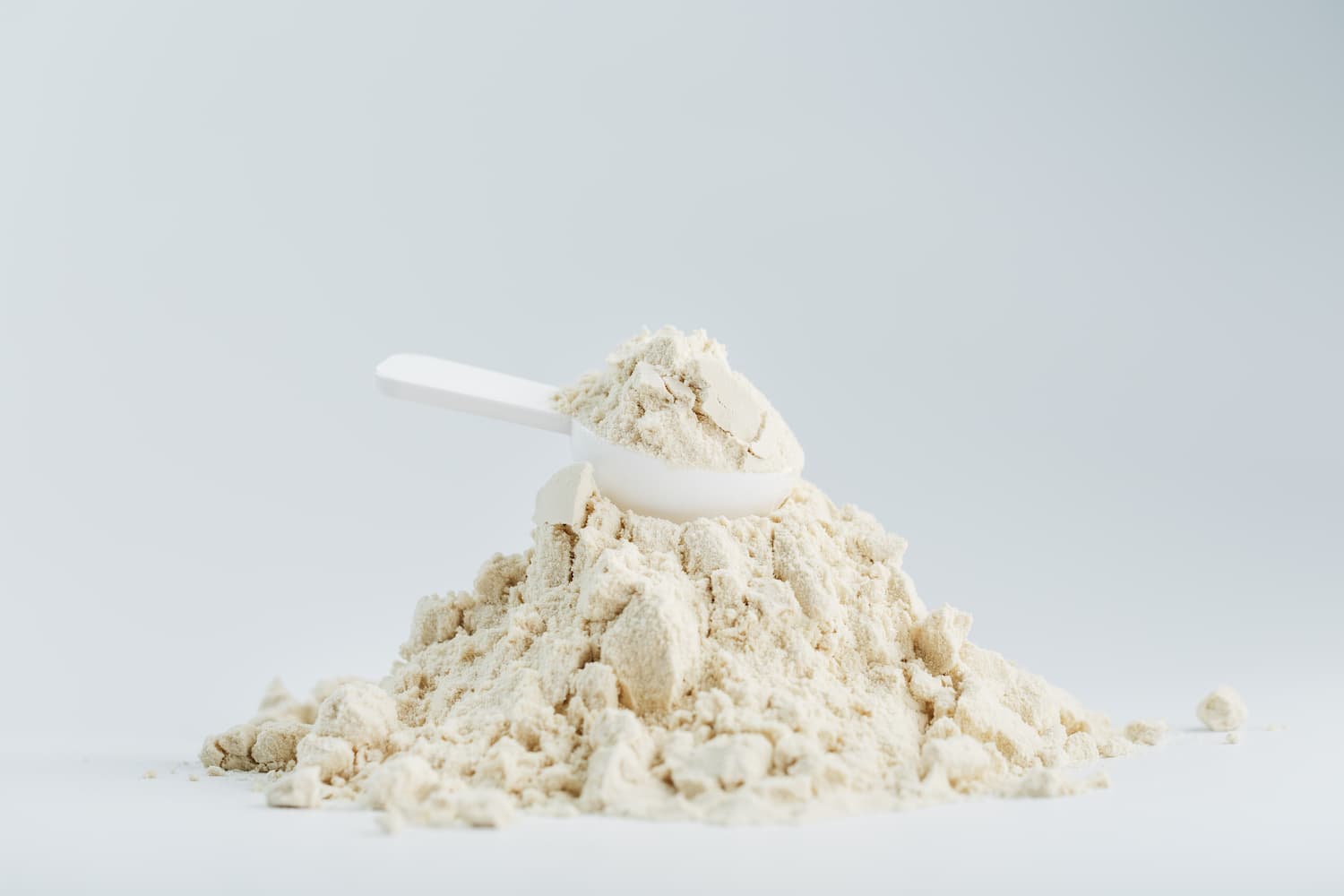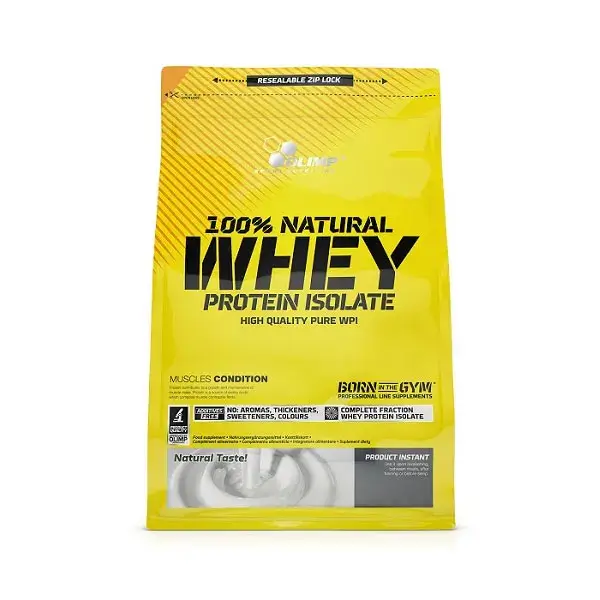BCAA - what it gives, does it work, side effects + expert opinions
BCAAs - do you need them? Together with a trainer and nutritionist, we dispel your doubts.


Learn more about our editorial process
.

Learn more about our editorial process
.

Learn more about our editorial process
.

Learn more about our editorial process
.
Why you can trust us
Articles on Natu.Care are written based on scientific research, data from government websites and other reliable sources. The texts are written in cooperation with doctors, nutritionists and other health and beauty experts. Articles are reviewed before publication and during significant updates.
.Learn more about our editorial process
.Information about advertisements
Content on Natu.Care may contain links to products from the sale of which we may receive a commission. When creating content, we adhere to high editorial standards and take care to be objective about the products discussed. The presence of affiliate links is not dictated by our partners, and we select the products we review ourselves completely independently.
.Learn more about our terms and Conditions
.Do you want something 'half a whistle'? You certainly don't. Then don't buy BCAAs.
According to a report by the organisation SkyQuest, the BCAA market was valued at $8.48 billion in 2021. Since the publication of the results of a study on rats in the 1980s, the popularity of branched-chain amino acids has not waned.
The popularity of branched-chain amino acids has not waned.
Everyone has BCAAs, I have them too. A colleague takes one, a friend takes one, maybe there's something to it? Or maybe all you need to do is... just eat that chicken and rice? Together with nutritionist and trainer Marta Kaczorek, I'll give you a handful of arguments to discuss in the locker room when someone asks: does this BCAA work or not?
.From this article you will learn:
- What are branched-chain amino acids - BCAAs. .
- What are the properties of leucine, isoleucine and valine.
- What are the properties of leucine, isoleucine and valine?
- Whether it makes sense to take BCAAs. .
- How much to take and when to take it if you do decide to take supplementation. .
- What the experts think about BCAAs. .
See also:
.- Whey protein isolate (WPI) .
- Whey protein concentrate (WPC) .
- Whey protein hydrolysate (WPH)
- Casein
- Protein nutrient .
- Vegetable protein
- How much protein per day .
BCAA - popular amino acids
.Amino acids are like the bricks that build your muscles. There are 20 of them and they are divided intoand:
- Endogenous, which your body can produce on its own and you do not need to consume them. There are 11 endogenous amino acids .
- Esogenic - EAA ( Essential Amino Acids), or essential amino acids, you need to supply them from food because the body cannot produce them on its own. There are 9 essential amino acids, and 3 of them are BCAAsand. .
What is a BCAA?
.BCAAs ( Branched Amino Acids) are leucine, isoleucine and valine - essential amino acids that the body cannot produce on its own. BCAAs are involved in anabolic (muscle building) processes and are a source of energy during exerciseand. They act like Lego blocks in the creation of muscle - without them you cannot build a strong and durable structure.
These three amino acids are grouped together because they are the only amino acids whose chain branches one wayand. Like all amino acids, BCAAs are the building blocks used by the body to produce proteins.
BCAAs make up as much as ⅓ of muscle proteins and are the only ones that are metabolised not in the liver, but in muscle..
 .
.
Marta Kaczorekclinical nutritionist and personal trainer
Leucine
.The favourite of cokeheads is one of the most important amino acids. It is the best studied and most effective of the entire amino acid pool in terms of stimulating muscle protein synthesisand. In addition to this, it is also responsible for post-workout muscle regeneration and aids the absorption of other amino acidsand.
.Leucine, probably the only one of the amino acids, without the contribution of others, can enhance MPS - muscle protein production. Leucine is worth supplementing on a low leucine vegetarian diet so that protein synthesis can occur more efficientlyand.
Isoleucine
.Like leucine, it is important for the muscular system, although its effect on protein synthesis is less. Interestingly, isoleucine is crucial for glucose metabolism, the body's ability to use sugar efficiently. Such effects may have benefits for physically active people, helping to maintain energy levels and performance.
Scientific research suggests that isoleucine may support immune system function, particularly the production of immune proteins such as immunoglobulinsand.
.Valine
.The main function of valine is to participate in energy processes in the body, such as cellular respiration. Valine may indirectly affect appetite regulation and improve the ability to coordinate movement.
Valine is also involved in energy processes in the body, such as cellular respiration.
Also, it influences the body's positive nitrogen balance, contributes to the maintenance of normal metabolic processes in muscle tissue, reduces recovery time and has an indirect stimulant effect.
Valine is the only one of the BCAAs that does not directly affect muscle protein synthesis, but has other important functions. It is essential for the proper functioning of the immune and nervous systems and is a substrate in the formation of vitamin B5.
Valine: Valine is an essential component of the immune system.
The trio: leucine, valine, isoleucine accounts for approximately 35-40% of all essential amino acids present in the body and 14-18% of those in your musclesand.
.ALLDEYNN WHEYROSE
Product description
Protein supplement containing whey protein concentrate (WPC) with added digestive enzymesós. It digests well, is an easy and quick way to provide protein and can be consumed by people with lactose intolerance. It will work well not only as a stand-alone drinkóy but also as a tasty addition to shakesóy, dessertsóy, oatmeal or omeletóy.
WHEYROSE contains five digestive enzymes that help break down macromolecules into smaller components, so that the ingredients from food and the nutrient are absorbed even better. This minimises or even eliminates digestive discomfort. Such an addition is rare in protein supplements.
.Pros and cons
Protein supplement containing whey protein concentrate (WPC) with added digestive enzymesós. It digests well, is an easy and quick way to provide protein and can be consumed by people with lactose intolerance. It will work well not only as a stand-alone drinkóy but also as a tasty addition to shakesóy, dessertsóy, oatmeal or omeletóy.
WHEYROSE contains five digestive enzymes that help break down macromolecules into smaller components, so that the ingredients from food and the nutrient are absorbed even better. This minimises or even eliminates digestive discomfort. Such an addition is rare in protein supplements.
.Additional information
Protein supplement containing whey protein concentrate (WPC) with added digestive enzymesós. It digests well, is an easy and quick way to provide protein and can be consumed by people with lactose intolerance. It will work well not only as a stand-alone drinkóy but also as a tasty addition to shakesóy, dessertsóy, oatmeal or omeletóy.
WHEYROSE contains five digestive enzymes that help break down macromolecules into smaller components, so that the ingredients from food and the nutrient are absorbed even better. This minimises or even eliminates digestive discomfort. Such an addition is rare in protein supplements.
.User review
Protein supplement containing whey protein concentrate (WPC) with added digestive enzymesós. It digests well, is an easy and quick way to provide protein and can be consumed by people with lactose intolerance. It will work well not only as a stand-alone drinkóy but also as a tasty addition to shakesóy, dessertsóy, oatmeal or omeletóy.
WHEYROSE contains five digestive enzymes that help break down macromolecules into smaller components, so that the ingredients from food and the nutrient are absorbed even better. This minimises or even eliminates digestive discomfort. Such an addition is rare in protein supplements.
.ALLDEYNN VEGEROSE
Product description
A protein supplement made from five plant proteins enriched with acacia fibre, flaxseed, MCT oil and the probiotic-prebiotic complex LactoWise®. It is a synbiotic thatós stimulates the developmentóy and growth of beneficial bacteria in the gastrointestinal tract and shows a beneficial effect on the condition of the digestive system.
Pros and cons
A protein supplement made from five plant proteins enriched with acacia fibre, flaxseed, MCT oil and the probiotic-prebiotic complex LactoWise®. It is a synbiotic thatós stimulates the developmentóy and growth of beneficial bacteria in the gastrointestinal tract and shows a beneficial effect on the condition of the digestive system.
Additional information
A protein supplement made from five plant proteins enriched with acacia fibre, flaxseed, MCT oil and the probiotic-prebiotic complex LactoWise®. It is a synbiotic thatós stimulates the developmentóy and growth of beneficial bacteria in the gastrointestinal tract and shows a beneficial effect on the condition of the digestive system.
Expert opinion
A protein supplement made from five plant proteins enriched with acacia fibre, flaxseed, MCT oil and the probiotic-prebiotic complex LactoWise®. It is a synbiotic thatós stimulates the developmentóy and growth of beneficial bacteria in the gastrointestinal tract and shows a beneficial effect on the condition of the digestive system.
ALLDEYNN VEGEROSE
Product description
A protein supplement made from five plant proteins enriched with acacia fibre, flaxseed, MCT oil and the probiotic-prebiotic complex LactoWise®. It is a synbiotic thatós stimulates the developmentóy and growth of beneficial bacteria in the gastrointestinal tract and shows a beneficial effect on the condition of the digestive system.
Pros and cons
A protein supplement made from five plant proteins enriched with acacia fibre, flaxseed, MCT oil and the probiotic-prebiotic complex LactoWise®. It is a synbiotic thatós stimulates the developmentóy and growth of beneficial bacteria in the gastrointestinal tract and shows a beneficial effect on the condition of the digestive system.
Additional information
A protein supplement made from five plant proteins enriched with acacia fibre, flaxseed, MCT oil and the probiotic-prebiotic complex LactoWise®. It is a synbiotic thatós stimulates the developmentóy and growth of beneficial bacteria in the gastrointestinal tract and shows a beneficial effect on the condition of the digestive system.
Expert opinion
A protein supplement made from five plant proteins enriched with acacia fibre, flaxseed, MCT oil and the probiotic-prebiotic complex LactoWise®. It is a synbiotic thatós stimulates the developmentóy and growth of beneficial bacteria in the gastrointestinal tract and shows a beneficial effect on the condition of the digestive system.
BCAAs - what do they do?
.Branched-chain amino acids perform a number of important functions in the body, especially in the context of physical activity, muscle building and recovery.
This is what BCAAs do for your body:
.Build muscle
.BCAAs (especially leucine) are like bricks that build your musclesand. For this reason, BCAAs are often used by physically active people to support muscle mass gain. Some studies suggest that BCAA supplementation - with leucine predominating in proportions - can help increase muscle massand.
It is leucine that activates the mTOR ( mammalian target of rapamycin) pathway, which stimulates muscle formation .
Prevent muscle breakdown
.During intense physical activity, your muscles can be broken down by BCAAs to provide energy. Adequate amounts of BCAAs can prevent this breakdown, as these amino acids reduce protein catabolism by inhibiting the enzymes responsible for this processand.
The balance between muscle protein breakdown and synthesis determines the amount of protein in the muscle. Muscle atrophy or breakdown occurs when protein breakdown exceeds muscle protein synthesis.
Reduce fatigue
.Even the best rested and carbohydrate-charged workout athlete experiences fatigue at some point during training. And how quickly he or she fatigues depends on several factors - intensity, fitness or the level of BCAAs in the bloodstreamand.
When exercising, muscles use up BCAAs, which causes their blood levels to drop. When this drops, tryptophan levels in the brain increaseand. Tryptophan is converted into serotonin, which contributes to the development of fatigue during exerciseand.
BCAAs may help reduce the fatigue experienced during exercise by reducing serotonin production in the brain.
A 2016 study suggests that BCAA supplementation may reduce perceived fatigue, allowing experienced athletes to run faster with the same level of perceived exertionand.
.Promote immunity
.Exercise can result in a temporary decrease in immunity. This is due to a decrease in glutamine, an amino acid that is 'fuel' for immune cells. And BCAAs can be converted to glutamine in the musclesand.
Glutamine is the amino acid with the highest concentration in the human body. It accounts for more than 60% of all free amino acids in muscle..
 .
.
Marta Kaczorekclinical nutritionist and personal trainer
Produce energy
.BCAAs can be stored in muscles to produce energy during exerciseand. Unlike most other amino acids, BCAAs are mainly broken down in the muscle rather than in the liver. For this reason, they are thought to play an important role in energy production during trainingand.
BCAAs are a key source of energy for muscles, not only by providing material to build muscle proteins, but also by directly participating in energy production at the cellular level.
Promote liver health
.Scientific research suggests that BCAAs may improve liver function and support people with disease of this important organ. A 2014 meta-analysis found that administering a BCAA-enriched solution to patients after liver surgery improved liver function, reduced the risk of complications and reduced hospital stayand.
.Participate in the production of neurotransmitters
.BCAAs influence the production of neurotransmitters including, among others, the excitatory glutamate and the inhibitory nervous system activity GABA. They also block certain neurohormonal changes, reduce feelings of fatigue and may promote longer work in both muscles and brain.
During exercise, BCAAs inhibit the entry of tryptophan into the brain, which produces serotonin, giving the body the signal to restand.
.Interesting research on BCAAs
.BCAAs and Alzheimer's disease
.The 2023 study examined the correlation between genes associated with BCAA levels and the risk of Alzheimer's disease. More than 115,000 participants provided genetic data to UK Biobank along with blood samples, which were used to assess serum BCAA levels. The results suggest that the incidence of Alzheimer's disease is associated with lower levels of branched-chain amino acidsand.
BCAAs in cirrhosis
.Patients with cirrhosis have changes in amino acid metabolism and reduced serum levels of branched-chain amino acids (BCAAs), which are thought to cause complications of the disease .
.Marrhosis is a severe form of liver disease characterised by the formation of scar tissue that impairs liver function.
A 2023 meta-analysis involving nine scientific studies suggested that BCAA supplementation reduced the risk of liver complications by 30%. The amino acids improved (increased) albumin levels to a moderate degree and improved (decreased) liver enzymes to a large degreeand.
BCAAs and sleep in veterans
.The 2022 study involved 26 veterans with traumatic brain injury (TBI, Traumatic Brain Injury). TBI is associated with chronic sleep disturbance and cognitive impairmentand. Veterans who took 30g of BCAAs for 21 days reported a reduction in insomnia symptomsand.
BCAAs not just for cokes
.Research involving 30 trained cyclists suggests that supplementation with BCAAs, L-cytrulline and A-GPC improves cycling performance and may be useful for those looking to improve athletic performance, particularly in disciplines requiring lower body muscle strength and enduranceand.
BCAAs versus minimising anorexia nervosa
.In a 2008 study, cancer patients were given 14.4 g of BCAAs for 7 days. The results showed a reduction in the patients' anorexia with a significant increase in food intake. Adequate nutrition is of paramount importance in the course of treatment for cancer patients.
Does BCAAs work?
.This question causes many a conflict in the gym locker room just as much as "isolate or concentrate" or "does a wide grip mean a wide back" (these are topics for other discussions over a glass of... protein nutrition of course).
Does BCAAs work?
Does BCAAs work? Yes, it works - your body uses these amino acids in various processes. They don't fly unnoticed by your muscles or bloodstream.
I have a better question - does BCAA supplementation make sense? No, it does not.
Although BCAAs can increase muscle protein synthesis, they cannot do so to their maximum potential without the other essential amino acids, such as those found in complete protein sources such as whey protein nutritionand.
.Research on BCAAs
.Scientific research suggests that if you want to build muscle, you need to focus on providing essential amino acids (EAAs)and. But all nine of them. Not just on BCAAs.
A 2014 study found that subjects' consumption of 5.6g of BCAAs after a workout exacerbated MPS by 22%. However, when a protein supplement containing all EAAs instead of BCAAs, not BCAAs alone, was given after a similar workout, the increase in MPS was as high as 49%and.
Another study from 2019 looked at how the severity of MPS differed after consuming 6 g of BCAAs and 30 g of milk protein (including approximately 6 g of BCAAs). Two hours after ingestion, both compounds exacerbated MPS to the same extent. However, 5 hours after ingestion, the severity of MPS after BCAA decreased to baseline levels, and MPS was still high in the 'protein' groupand.
Summary
.BCAAs as a group of three amino acids 'work' because they perform specific functions in the body. However, BCAA supplementation doesn't make sense because it's only 3 of the 9 amino acids you need for muscle growth. It's better to take EAAs. And of course - train hard.
.What BCAAs won't give you?
.It also needs to be clear - BCAAs will not give you what you may have heard about. Let's clarify that from BCAA supplementation:
.- .
- You will not grow muscles. For that you need hard training and an adequate supply of protein. Taking BCAAs alone will not work.
- You will not lose weight. Taking BCAAs before or after a workout does not affect the composition (muscle/fat ratio) of your physique ("burns fat, retains muscle").
- Muscle pump is not increased. BCAAs are often an ingredient in "intra" supplements, but they are not responsible for the pump or stimulation, but the citrulline, taurine or caffeine they contain. .
Why are BCAAs a popular supplement?
.It started ... with rats. In 1981, Hungarian scientist Dr Maria G. Buse gave rats injections of glucose and BCAAsand during a scientific study. She observed that - simplistically - this mixture significantly increased the process of protein formation, which can promote muscle building.
The dietary supplement manufacturers said Say no more and the aggressive marketing of BCAAs began. Just use "testosterone" in advertising and the product gains +50 to interest. "BCAAs can have a positive effect on testosterone levels," tempts one manufacturer. But testosterone is also affected by, for example, zinc, magnesium or vitamin B6, which you will sooner miss than BCAAsand.
Unfortunately, sports enthusiasts around the world are spending millions of coins on BCAAs, rather than investing in better researched and more effective muscle-building supplements such as creatine or a simple protein supplement.
BCAA - the best sources from the diet
.Natural sources of branched chain amino acids are definitely tastier than dietary supplement powder. Below you will read what are the richest animal and plant-based products in BCAAs. Remember that they also contain the other amino acids.
Animal sources of BCAAsand:
- red meat (beef, pork, lamb, goat), .
- poultry (chicken, turkey, duck, goose), .
- fish (tuna, salmon), .
- eggs, .
- protein salad, .
Plant sources of BCAAsand:
- tofu, .
- soybean, .
- fasola, .
- chickpeas, .
- nuts, .
Daily BCAA requirements
.The daily requirement for BCAAs in an adult is approximately 0.5-1 g per kg of body weight. People who are very physically active or building muscle mass may need more. Typically, athletes need to provide 10 g BCAAs per day in 2-3 servings.
How to use BCAAs?
.Follow the manufacturer's recommendation on the BCAA supplement packaging, which is usually 10-20 g per day, in two portions. The powder should be mixed in 200-300ml of water and drunk immediately after consumption.
BCAAs before or after training?
.Manufacturers typically recommend taking 1 serving of BCAAs 15-30 minutes before training and 1 serving within 30 minutes after training to inhibit the breakdown of muscle proteins used for energy and to support muscle growth.
BCAA levels in the blood reach their highest concentration 30 minutes after ingestion of the supplement.
See also: Protein before or after training?
.Side effects of BCAA use
.Normally, the use of BCAA supplements has no side effects and is safe for most peopleand. When BCAAs are taken with other active ingredients, side effects specific to the latter may occur - for example, taking BCAAs in a pre-workout (which contain, for example, caffeine, taurine, beta-alanine) may result in headaches, stomach aches, muscle tremors or nausea.
Maple syrup disease (MSUD) is caused by a disorder in the metabolism of BCAAs, making it imperative to avoid supplementation with these amino acids for this rare, genetic condition.
Is it worth taking BCAAs? Expert opinions
BCAA will boost muscle protein synthesis, but the muscle gains on this supplement are not very impressive as it is only 3 of the 9 important amino acids needed to grow. In my opinion, this is money thrown down the drain. You want to protect your muscles and make them grow, make sure you get a complete protein in your diet, and from supplements choose EAAs over BCAAs..
 .
.
Marta Kaczorek clinical nutritionist and personal trainer
I don't recommend BCAAs because I think it's a waste of money for this supplement. If you're looking to build muscle mass, it's best to start with a balanced diet and an adequate supply of protein, and if you're finding it hard to 'go through' that much, then it's worth introducing a supplement, but not BCAAs.
I don't recommend a supplement.
Protein supplements or creatine will work better..
 .
.
Julia SkrajdaDietitian
.See also:
.- Omega-3 fatty acids in an athlete's diet
- Whey protein isolate (WPI) .
- Whey protein concentrate (WPC) .
- Whey protein hydrolysate (WPH)
- Protein-rich products .
- Creatine
- Citrulline
- Arginine
- Glutamine
- L-carnitine
- Caffeine
Summary
.- BCAA ( Branched Amino Acids) BCAAs are leucine, isoleucine and valine. They are 3 of the 9 essential amino acids (EAA). .
- The body is unable to produce EAAs on its own and you must supply them with food. .
- In practice, on both meat and plant-based diets, supplying BCAAs is fairly easy. .
- The best sources of BCAAs are red meat, poultry, fish and tofu, soya and chickpeas. .
- BCAAs build muscle and prevent muscle breakdown, reduce feelings of fatigue, produce energy and support immunity and liver health. .
- To build muscle mass, you need all nine essential amino acids, not just BCAAs, so there is little benefit in supplementing them. It is better to buy products with EAA. .
- It is usual to use 10-20g of BCAAs in two daily servings. .
FAQ
.What is better BCAA or EAA?
.EAAs (a set of 9 essential amino acids) are better for supplementation than BCAAs (only 3 essential amino acids), because consuming EAAs is up to 50% more effective anabolically. For muscle growth and regeneration, it is better to provide all amino acids, not just three.
BCAA 8-1-1 or 2-1-1?
.The proportion of the individual amino acids found in a BCAA does not matter much, so both a 2:1:1 and an 8:1:1 BCAA will be a good choice if you want to supply yourself with leucine, isoleucine and valine. The 2:1:1 BCAA is the most popular among dietary supplement manufacturers.
What is better HMB or BCAAs?
.HMB (hydroxymethylbutyrate) is used to increase muscle mass and strength, as well as to reduce muscle protein breakdown and improve post-workout recovery. BCAAs are essential for protein biosynthesis and are therefore crucial for muscle growth and regeneration. BCAAs also serve as energy fuel for muscles, which can be beneficial during prolonged exercise.
If you are looking to improve performance and endurance during training, BCAAs may be a better choice. However, if your goal is to gain muscle mass and strength, HMB may be better.
If your goal is to gain muscle mass and strength, HMB may be better.
BCAA on reduction - does it help?
.Some scientific studies suggest that BCAAs on reduction may aid fat loss. In one study, wrestlers consuming a high-protein reduction diet supplemented with BCAAs lost 1.6kg more than those given soy protein instead of BCAAs.
Other studies have shown that people consuming an average of 15g of BCAAs per day from their diet may have up to a 30% lower risk of being overweight or obese than those consuming an average of 12g per day.
How much BCAAs you should take on reduction depends on your overall diet and training goals. Therefore, if in doubt, consult a personal trainer or nutritionist.
Can you combine BCAAs with creatine?
.Yes, you can combine BCAAs with creatine. This is a popular combination that promotes muscle mass development and protects against muscle loss, as well as supporting post-workout recovery. It is usually recommended to take 5g of creatine and 10-20g of BCAAs in 1-2 servings per day.
BCAA: what are the opinions of doctors?
.Doctors' opinions on BCAAs vary, with most recommending the "golden rule". - supplement what you may be deficient in. BCAA deficiency is unlikely, and besides, you need all 9, not just 3 amino acids BCAAs to realise the full potential of muscle mass development.
BCAA for sourdough - does it work?
.Yes, BCAAs can be helpful for sourdough because they have a stimulating effect on muscle proteins and can accelerate muscle repair and recovery. However, an adequate supply of protein (approximately 1.8-2.2.g of protein per kg of body weight) and creatine are best for muscle building and recovery.
Beta-alanine or BCAAs?
.Beta-alanine and BCAAs can both be consumed simultaneously. However, they produce different results, so if your goal is to improve performance and endurance, beta-alanine will be a better choice. If you are looking to increase muscle mass or improve muscle recovery after training, choose BCAAs.
Sources
.See all
.Blomstrand, E., Eliasson, J., Karlsson, H. K. R., & Köhnke, R. (2006). Branched-chain amino acids activate key enzymes in protein synthesis after physical exercise. The Journal of Nutrition, 136(1 Suppl), 269S-73S. https://doi.org/10.1093/jn/136.1.269S
Blomstrand, E., Hassmén, P., Ek, S., Ekblom, B., & Newsholme, E. A. (1997). Influence of ingesting a solution of branched-chain amino acids on perceived exertion during exercise. Acta Physiologica Scandinavica, 159(1), 41-49. https://doi.org/10.1046/j.1365-201X.1997.547327000.x
Bloomgarden, Z. (2018). Diabetes and branched-chain amino acids: What is the link? Journal of Diabetes, 10(5), 350-352. https://doi.org/10.1111/1753-0407.12645
Branch Chain Amino Acid (BCAA) Market Size, Share, Growth Analysis, By Form, Type, Application, Flavor, Distribution Channel, Region-Industry Forecast 2023-2030. (n.d.). Retrieved August 30, 2023, from https://www.skyquestt.com/report/branch-chain-amino-acid-market
Buse, M. G. (1981). In vivo effects of branched chain amino acids on muscle protein synthesis in fasted rats. Hormone and Metabolic Research = Hormon- Und Stoffwechselforschung = Hormones Et Metabolisme, 13(9), 502-505. https://doi.org/10.1055/s-2007-1019316
Chen, I.-F., Wu, H.-J., Chen, C.-Y., Chou, K.-M., & Chang, C.-K. (2016). Branched-chain amino acids, arginine, citrulline alleviate central fatigue after 3 simulated matches in taekwondo athletes: A randomized controlled trial. Journal of the International Society of Sports Nutrition, 13, 28. https://doi.org/10.1186/s12970-016-0140-0
Cheng, I.-S., Wang, Y.-W., Chen, I.-F., Hsu, G.-S., Hsueh, C.-F., & Chang, C.-K. (2016). The Supplementation of Branched-Chain Amino Acids, Arginine, and Citrulline Improves Endurance Exercise Performance in Two Consecutive Days. Journal of Sports Science & Medicine, 15(3), 509-515.
Duan, Y., Li, F., Li, Y., Tang, Y., Kong, X., Feng, Z., Anthony, T. G., Watford, M., Hou, Y., Wu, G., & Yin, Y. (2016). The role of leucine and its metabolites in protein and energy metabolism. Amino Acids, 48(1), 41-51. https://doi.org/10.1007/s00726-015-2067-1
Effects of Oral Branched-Chain Amino Acids (BCAAs) Intake on Muscular and Central Fatigue During an Incremental Exercise-PMC. (n.d.). Retrieved 29 August 2023, from https://www.ncbi.nlm.nih.gov/pmc/articles/PMC7126259/
Falavigna, G., Alves de Araújo, J., Rogero, M. M., Pires, I. S. de O., Pedrosa, R. G., Martins, E., Alves de Castro, I., & Tirapegui, J. (2012). Effects of diets supplemented with branched-chain amino acids on the performance and fatigue mechanisms of rats submitted to prolonged physical exercise. Nutrients, 4(11), 1767-1780. https://doi.org/10.3390/nu4111767
Fuchs, C. J., Hermans, W. J. H., Holwerda, A. M., Smeets, J. S. J., Senden, J. M., van Kranenburg, J., Gijsen, A. P., Wodzig, W. K. H. W., Schierbeek, H., Verdijk, L. B., & van Loon, L. J. C. (2019). Branched-chain amino acid and branched-chain ketoacid ingestion increases muscle protein synthesis rates in vivo in older adults: A double-blind, randomized trial. The American Journal of Clinical Nutrition, 110(4), 862-872. https://doi.org/10.1093/ajcn/nqz120
Harrington, R. N. (2023). Effects of branched chain amino acids, l-citrulline, and alpha-glycerylphosphorylcholine supplementation on exercise performance in trained cyclists: A randomized crossover trial. Journal of the International Society of Sports Nutrition, 20(1), 2214112. https://doi.org/10.1080/15502783.2023.2214112
Harty, P. S., Cottet, M. L., Malloy, J. K., & Kerksick, C. M. (2019). Nutritional and Supplementation Strategies to Prevent and Attenuate Exercise-Induced Muscle Damage: A Brief Review. Sports Medicine - Open, 5(1), 1. https://doi.org/10.1186/s40798-018-0176-6
Holeček, M. (2018a). Branched-chain amino acids in health and disease: Metabolism, alterations in blood plasma, and as supplements. Nutrition & Metabolism, 15(1), 33. https://doi.org/10.1186/s12986-018-0271-1
Holeček, M. (2018b). Branched-chain amino acids in health and disease: Metabolism, alterations in blood plasma, and as supplements. Nutrition & Metabolism, 15, 33. https://doi.org/10.1186/s12986-018-0271-1
Impact of supplementation with amino acids or their metabolites on muscle wasting in patients with critical illness or other muscle wasting disorders: A systematic review. (2014). In Database of Abstracts of Reviews of Effects (DARE): Quality-assessed Reviews [Internet]. Centre for Reviews and Dissemination (UK). https://www.ncbi.nlm.nih.gov/books/NBK241775/
Joy, J. M., Lowery, R. P., Wilson, J. M., Purpura, M., De Souza, E. O., Wilson, S. M., Kalman, D. S., Dudeck, J. E., & Jäger, R. (2013). The effects of 8 weeks of whey or rice protein supplementation on body composition and exercise performance. Nutrition Journal, 12, 86. https://doi.org/10.1186/1475-2891-12-86
Kimball, S. R., & Jefferson, L. S. (2006). Signaling pathways and molecular mechanisms through which branched-chain amino acids mediate translational control of protein synthesis. The Journal of Nutrition, 136(1 Suppl), 227S-31S. https://doi.org/10.1093/jn/136.1.227S
Meta-analysis of branched chain amino acid-enriched nutrition to improve hepatic function in patients undergoing hepatic surgery. (2014). In Database of Abstracts of Reviews of Effects (DARE): Quality-assessed Reviews [Internet]. Centre for Reviews and Dissemination (UK). https://www.ncbi.nlm.nih.gov/books/NBK263202/
Muscaritoli, M., Costelli, P., Aversa, Z., Bonetto, A., Baccino, F. M., & Rossi Fanelli, F. (2008). New strategies to overcome cancer cachexia: From molecular mechanisms to the "Parallel Pathway". Asia Pacific Journal of Clinical Nutrition, 17 Suppl 1, 387-390.
Negro, M., Giardina, S., Marzani, B., & Marzatico, F. (2008). Branched-chain amino acid supplementation does not enhance athletic performance but affects muscle recovery and the immune system. The Journal of Sports Medicine and Physical Fitness, 48(3), 347-351.
No.
Nie, C., He, T., Zhang, W., Zhang, G., & Ma, X. (2018). Branched Chain Amino Acids: Beyond Nutrition Metabolism. International Journal of Molecular Sciences, 19(4), 954. https://doi.org/10.3390/ijms19040954
Portier, H., Chatard, J. C., Filaire, E., Jaunet-Devienne, M. F., Robert, A., & Guezennec, C. Y. (2008). Effects of branched-chain amino acid supplementation on physiological and psychological performance during an offshore sailing race. European Journal of Applied Physiology, 104(5), 787-794. https://doi.org/10.1007/s00421-008-0832-5
Qian, X.-H., Liu, X.-L., Zhang, B., Lin, Y., Xu, J.-H., Ding, G.-Y., & Tang, H.-D. (2023). Investigating the causal association between branched-chain amino acids and Alzheimer's disease: A bidirectional Mendelian randomized study. Frontiers in Nutrition, 10, 1103303. https://doi.org/10.3389/fnut.2023.1103303
Reidy, P. T., Walker, D. K., Dickinson, J. M., Gundermann, D. M., Drummond, M. J., Timmerman, K. L., Fry, C. S., Borack, M. S., Cope, M. B., Mukherjea, R., Jennings, K., Volpi, E., & Rasmussen, B. B. (2013). Protein blend ingestion following resistance exercise promotes human muscle protein synthesis. The Journal of Nutrition, 143(4), 410-416. https://doi.org/10.3945/jn.112.168021
Solon-Biet, S. M., Cogger, V. C., Pulpitel, T., Wahl, D., Clark, X., Bagley, E., Gregoriou, G. C., Senior, A. M., Wang, Q.-P., Brandon, A. E., Perks, R., O'Sullivan, J., Koay, Y. C., Bell-Anderson, K., Kebede, M., Yau, B., Atkinson, C., Svineng, G., Dodgson, T., ... Simpson, S. J. (2019). Branched chain amino acids impact health and lifespan indirectly via amino acid balance and appetite control. Nature Metabolism, 1(5), 532-545. https://doi.org/10.1038/s42255-019-0059-2
Tipton, K. D., Hamilton, D. L., & Gallagher, I. J. (2018). Assessing the Role of Muscle Protein Breakdown in Response to Nutrition and Exercise in Humans. Sports Medicine (Auckland, N.z.), 48(Suppl 1), 53-64. https://doi.org/10.1007/s40279-017-0845-5
Witard, O. C., Jackman, S. R., Breen, L., Smith, K., Selby, A., & Tipton, K. D. (2014). Myofibrillar muscle protein synthesis rates subsequent to a meal in response to increasing doses of whey protein at rest and after resistance exercise. The American Journal of Clinical Nutrition, 99(1), 86-95. https://doi.org/10.3945/ajcn.112.055517
Yang, J., Chi, Y., Burkhardt, B. R., Guan, Y., & Wolf, B. A. (2010). Leucine metabolism in regulation of insulin secretion from pancreatic beta cells. Nutrition reviews, 68(5), 270-279. https://doi.org/10.1111/j.1753-4887.2010.00282.x
Yang, J., Dolinger, M., Ritaccio, G., Mazurkiewicz, J., Conti, D., Zhu, X., & Huang, Y. (2012). Leucine Stimulates Insulin Secretion via Down-regulation of Surface Expression of Adrenergic α2A Receptor through the mTOR (Mammalian Target of Rapamycin) Pathway. The Journal of Biological Chemistry, 287(29), 24795-24806. https://doi.org/10.1074/jbc.M112.344259
Editorials
Meet the team



Vegan protein supplements add protein to the diets of athletes and non-athletes alike.

Look after the protein in your diet whether you are on a weight gain, weight reduction or weight maintenance.

Methionine is a little-known amino acid that is responsible for many functions in the body.



